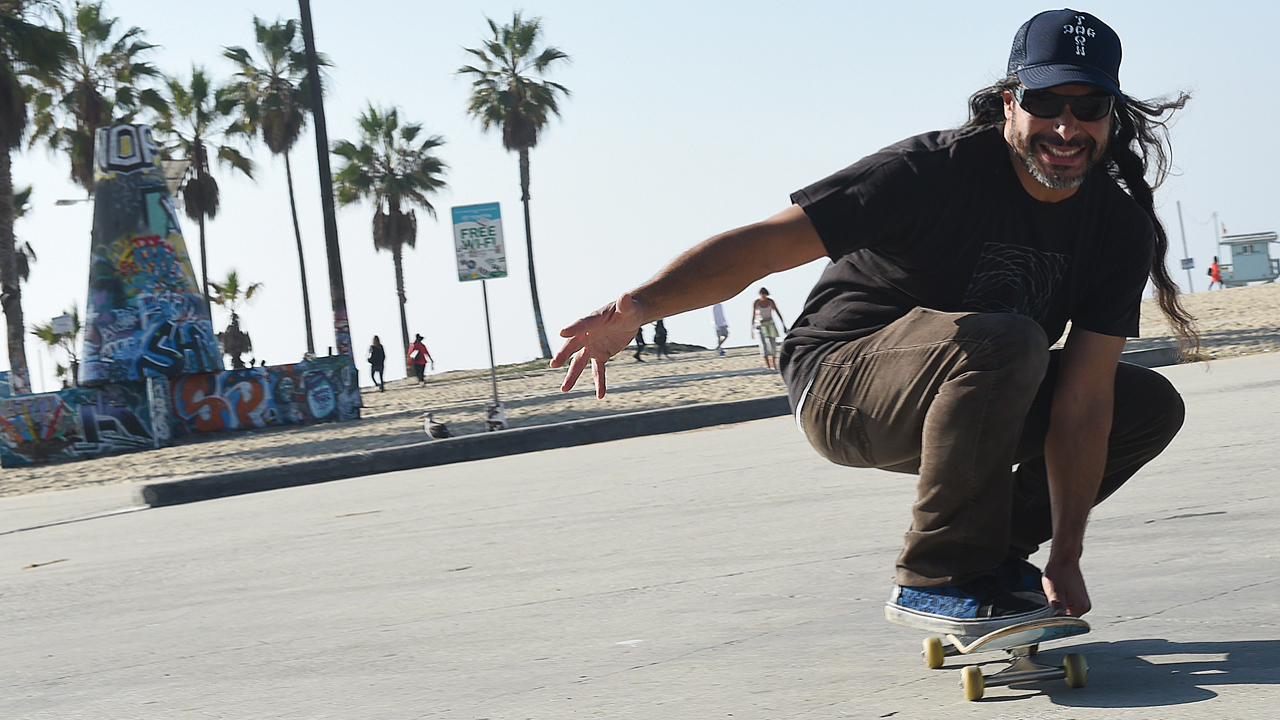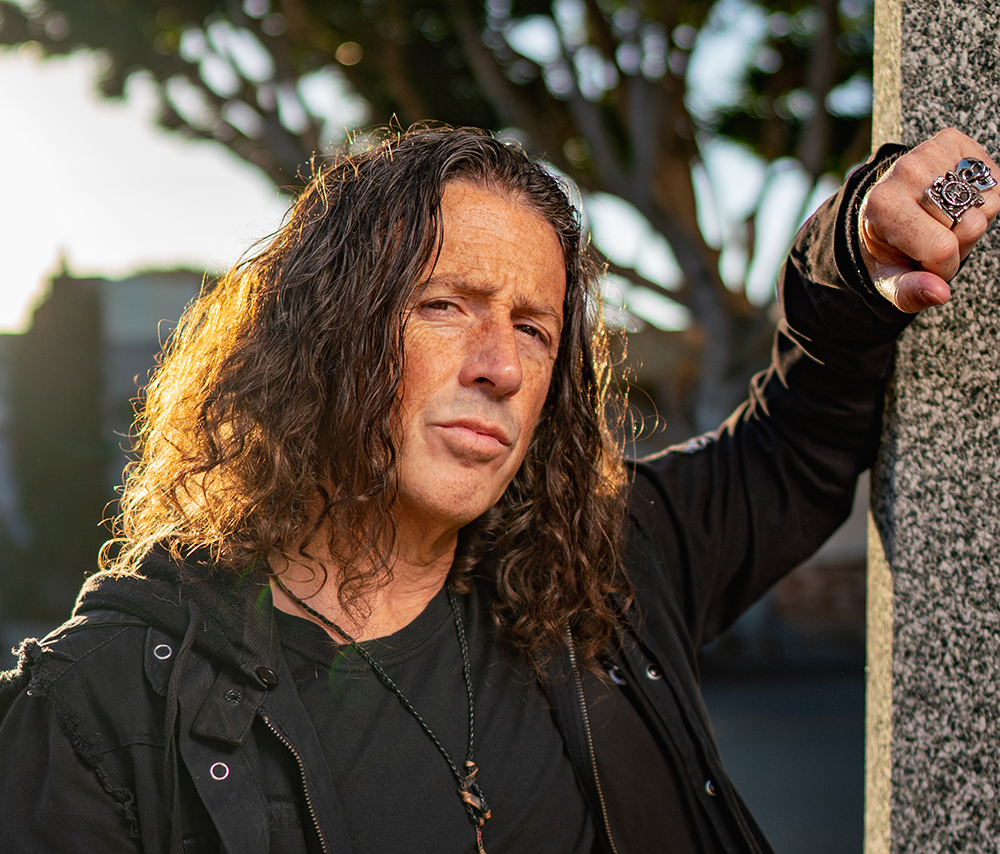As skateboarding continues its inexorable global evolution, the connection between that sport and music is as seamless as the rhythmic dovetail between John Bonham and John Paul Jones.
While punk and hardcore are most closely associated with skateboarding, thanks to pros-turned-musicians like Steve Caballero (The Faction) and original Z-Boy Tony Alva (G.F.P. et al.), no other sector of music boasts as many dyed-in-the-wool shredders as heavy metal. We dipped back into the Metal Hammer archives and found ten of metal’s best skateboarders.
Buz McGrath
The blurry-fingered riff machine behind Unearth’s bludgeoning sound has long been a devoted bluntslider. With a ruthless touring regimen that sees the Massachusetts metallers on the road more than at home, Buz relies on skateboarding to both blow off steam and to connect with fellow curb dogs around the world.
James Hetfield
Along with Kirk Hammett, James Hetfield gleefully dove into the local skate culture of the early-‘80s, suffering an eye-watering string of injuries along the way. After famously breaking his arm skateboarding, forcing the cancellation of a 1986 show in Evansville, Indiana, the singer is now barred by management from skateboarding on tour. To this day, skateboarding metallers around the world have James to thank for similar contractual shackles.
Dimebag Darrell
Long before Pantera saved American metal, a teenage Dimebag was popping shove-its and 50-50 grinds on his Lucero skateboard. It’s a chapter in his legacy often lost in the shadow of his dizzying fretboard mastery, and yet skateboarding was one of Darrell’s favourite pastimes.
Pantera fans rejoiced in 2012 when Elephant Skateboards released the official Dimebag Darrell skate deck with a custom video that featured a previously unreleased song by Darrell called Twisted, dug out of his personal archives by Dime’s longtime girlfriend Rita Haney.
Mike Muir
The mercurial frontman for Suicidal Tendencies grew up in Venice and was raised in Santa Monica, where his brother Jim was a member of the world-famous Dogtown skateboarding crew. Mike began his own voyage by skateboarding to elementary school and following Jim around to local contests.
While the vocalist eventually found his fame with Suicidal, as well as Infectious Grooves, No Mercy and Los Cykos, Mike’s music career has been inextricably entwined with the legendary skating culture of his hometown.
Suicidal Tendencies have released a number of odes to skateboarding and the surrounding culture, such as 1987’s Possessed To Skate and its utterly majestic homemade video that included top skaters like Steve Caballero and Jesse Martinez.
Mike Vallely
Before taking over as frontman for Black Flag, Mike V fronted Revolution Mother and guested on Jamey Jasta’s Heart Of A Warrior. While he has also played minor league hockey and worked as a stuntman, Mike’s emerged as one of California’s top professional skaters, hooking up with a number of sponsors before ultimately founding Elephant Skateboards. Soon after launching his company, Mike reaffirmed his allegiance to metal by releasing the official Dimebag Darrell skateboard deck.
Eddie Veliz
The Kyng guitarist and vocalist began skateboarding when he was five years old and never looked back, telling Metal Hammer, “I’ve skated everywhere from Minnesota to Alabama, finally tasting all those great skate spots that I read about in magazines.
We were out on tour with Ten Years and their singer, Jesse Hasek, is a really good fucking skater. He and I would just go out and skate, kick curbs, practice 180 flips and all that shit. We do it whenever we can.” Despite notching a gnarly ankle sprain after unsuccessfully trying to hit an eleven-stair rail, Eddie never leaves for a tour without his deck.
Tony Harnell
Before he sold a million records fronting Norwegian power metal outfit TNT, the renowned vocalist (with a supernova-sized, four-octave range) was scoring sponsorships, free decks and custom Vans as a pro skater in his hometown of San Diego. Talking to Metal Hammer, Tony recalls, “Growing up in San Diego and Encinitas — which I still consider my little paradise – I was right there for the whole skateboarding explosion.”
His first competition however, would be memorable for all the wrong reasons. “After my one and only competition,” he tells us, “I went over to another part of the park and skated this full pipe and I fell trying to do an air out of the pipe into the half-pipe and I got a concussion. So I got out of skating competitively after that and free skated at the local parks, where I got way better than I ever was competing.”
While his new career has proved exponentially more fulfilling and less brain-bludgeoning, Tony concedes that the passion for skating still burns hot, speculating, “Maybe someday I’ll move back to Encinitas and get a longboard and just ride all day…” An interesting side note is that Tony’s dad, Boyd Harnell, would eventually become one of the sport’s premier photographers, forging strong ties with Tony Alva and the original Dogtown crew – even shooting their secret empty pool sessions.
Rob Trujillo
In a previous issue of Metal Hammer, we spent some time at the Venice skate park with Rob Trujillo, where he dished on growing up in Venice, California — aka the skateboarding Mecca — telling us, “Back when I was twelve or thirteen, I started skateboarding in a lot of the parks in the late-Seventies. I connected to skateboarding just by being raised in the Venice area.”
Rob pulled back on his skateboarding after a lower back injury several years ago, but he still sidewalk surfs now and then and spends a good deal of time at the local skate park with his son Tye, a burgeoning skater himself.
Rob told us, “Usually on Saturdays there’s a couple skaters who bring ghetto blasters and they pump old school, straight up punk rock and there’s a thug element to punk, like real punks and the stuff they’re playing is punk. Like Fear and Suicidal and old stuff like that. A lot of the early-80s LA punk bands. Then you hear some Sabbath too, so it’s really diverse it’s cool.”
Phil Sgrosso
The scything Wovenwar guitarist has been shredding skateboards and fretboards since sixth grade and Phil’s uncanny ability to sidestep the hurdles of fear and common sense has led him to master a jaw-dropping quiver of ankle-punishing skate tricks over the years.
He tells Metal Hammer, “I stopped skateboarding for a while in freshman year when my parents moved to a new house, where we had nothing but a long driveway that wasn’t smooth at all. That’s when I started playing guitar more often, because I was out there thinking, okay, what am I going to do now? I guess play guitar.”
While he can no longer skate with the same unhinged aggression as he once did (see James Hetfield, above), Phil sees a natural connection between music and skateboarding, explaining,
“A trick is just like a riff — you have to work your way up. First you learn how to ollie, then you work your way up to backside flip and frontside flip, and you get more technical as you get more comfortable. Part of why music and skateboarding are great is because you do them with your friends. You could do either on your own, but it’s better with a group of dudes, doing something you love.”
Randy Blythe
The Lamb Of God frontman has amassed over three decades of skating under his belt, beginning with the early banana boards that marked the sport’s cultural entree, through to the present.
Combining his passions for film, photography and skating, Randy has posted a number of his own skating videos on YouTube and indeed credits the sport for his introduction to hardcore music.
A 2012 skateboarding accident left the singer with a gruesomely sprained ankle, and in the great tradition of the skateboarding pioneers before him, Randy quickly posted a picture of his “cankle” online and resumed uploading skateboard videos as soon as it healed.

